Healing Mind-Body-Soul
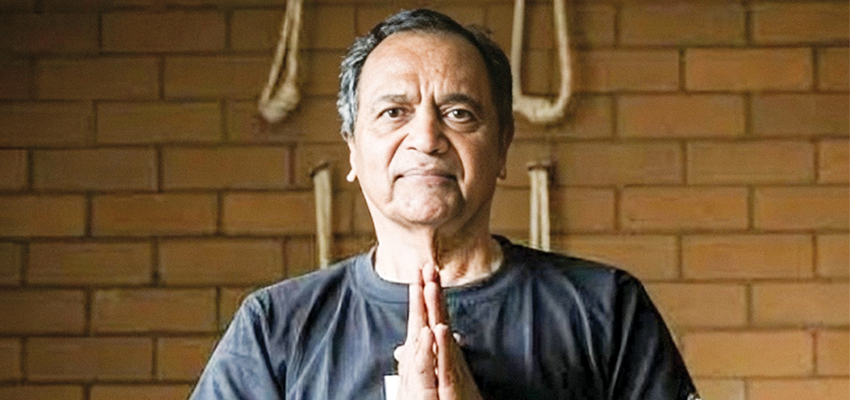
Concerned about the increasing number of people suffering from addiction and the ignorance prevailing in society regarding the same, Padma Shri Rev. Father Joseph Pereira, (Residential Priest, Mount Carmel Church, Bandra), founded the Kripa Foundation and his extra-ordinary ideas of Kripa Model, Iyengar Yoga and Wounded Healers for saving many lives from the clutches of addictions. An adjunct professor, yoga trainer, and spiritual healer, Father Joseph, for last 55 years, has been devotedly rehabilitating and taking care of those affected by chemical dependency, substance abuse, and HIV/ AIDS. Corporate Citizen brings you his extra-ordinary and compassionate journey
Serving the poor
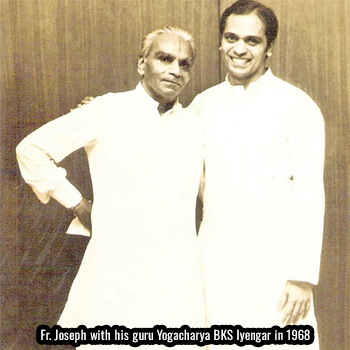
As said in the Bhagavad Gita “Yoga is the journey of the self, through the self, to the self”, and reflecting on the same premise, Fr. Joseph Pereira, through his unique models of healing, has levelled up yoga and meditation and used it in bringing change to the lives of over 70,000 individuals affected by addictions. “What I am doing is Jana Seva as Janardhana Seva (Service to mankind is service to the Almighty). It's a blend of Mother Teresa and my Guruji, Yogacharya BKS Iyengar. Mother Teresa taught me to go to the poorest of the poor, and Guruji taught me to go to the poorest of the poor in health,” said Fr. Joseph.
Mother Teresa’s guidance
The journey of jana seva began in 1971, when Fr. Joseph completed four years of priesthood. It was a time when six of his colleagues from Pune and Mumbai quit priesthood, and he too was wanting to quit. However, an interaction with Mother Teresa encouraged him to not quit, and he got into this extra-ordinary journey of jana seva, at the age of 38. Fr. Joseph recalls, “The beginning of the Kripa Foundation happened after my encounter with Mother Teresa. She asked me to stay in the institution to do something for the institution, even if it takes ten years.”
"We are dealing with all types of people who are affected by addiction and teaching them how to deal with their afflicted loved ones"
- Fr. Joseph Pereira
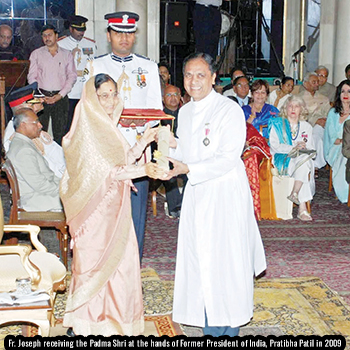
Mother Teresa assigned Fr. Joseph to teach sisters of Missionaries of Charity how to handle the addicts, especially female addicts. After his training, she built a special institution in Tangra, Kolkata, for nuns to carry out the work of deaddiction treatment in Kolkata. “I kept on working in her charity centre, and in 1981, I was doing a programme at Ashadan in Byculla, Mumbai.
That's where she came with the superior of the home, Sister Kabrini—an Australian girl, who shared the problem of alcoholics, and asked for the guidance of Mother Teresa. So Mother Teresa asked me to take responsibility for these alcoholics,” he said. He added, “I took three of these alcoholics, as well as seven drug addicts from Bandra, in Mumbai, and started Kripa Foundation in a church annex in Bandra. That’s how I begin by doing something within the church, instead of leaving the church.”
The importance of Brahmacharya
A significant aspect of his extraordinary journey was the influence of his guru, BKS Iyengar. Though he had been practicing priesthood for years, he actually emerged as a priest with the blessings of his guru. Fr. Joseph recalls, “I went through 10 years of spiritual training required for becoming a priest. After those 10 years, when I got into working with people, I realised that I had no idea of the requirements of my body. Because of my improper understanding of Brahmacharya, I was always falling sick. I was known as a singing priest, but every time I had to perform, I had problems with my throat. So, when I met Guruji, I started practicing yoga. I not only got rid of all the physical ailments, but Guruji also led me to understand that the body played a big role in maintaining mental health and spirituality.”
A holistic approach to healing

After acquiring deep knowledge of yoga and meditation, Fr. Joseph developed special programmes, naming them ‘Wounded Healers’, ‘the Kripa Model', and ‘the Iyengar Yoga’—a holistic approach that combines medical care, psychological support and spiritual guidance. These techniques has reached across 130 countries. The Kripa Foundation, says Fr. Joseph, has become a fast-growing global organisation. It is the inspiration of Mother Teresa to reach out to the suffering people, and his guru BKS Iyengar has given him this dimension and spirituality of the body, which forms an integral part of the programme.
The Kripa Model includes an hour of yoga, followed by 20 minutes of meditation, and 10 minutes of thought for the day, which is generally taken from the Alcoholics Anonymous and Narcotics Anonymous literature that sets the person for the whole day.
The Kripa Model programme is followed by an aftercare programme, where the people of the Alcoholics Anonymous group or the Narcotics Anonymous group, have to observe the four benchmarks: speak up every day, “I am an addict and I am an alcoholic”, “I cannot do this alone, I need help”, third is, strict time management and fourth is, seek healing through prayer and meditation.
Fr. Joseph adds, “Today people are craving for peace, love, joy and health. Your body never tells lies, and that is why we make people go through this particular type of assessment because it's only then that people can really know that the change has taken place.”
Fr. Joseph informs, “We have a group of almost 300 people from four time zones, from Brazil, South Africa, to Brisbane, Australia. We are dealing with all types of people who are affected by addiction and teaching them how to deal with their afflicted loved ones. These addictions need to be understood with the ‘I-Thou’ relationship, and it is only possible if you talk in their language and know their suffering.”
The rise of addiction
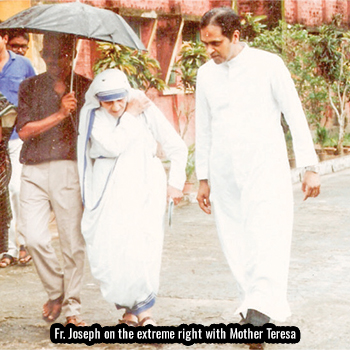
In 1981, when Fr. Joseph began this work, he said the average age of an addict used to be 25 to 55 years and today it is 14 to 55 years. And recently, the youngest addict he came across while working in the slums, was eight years old. “You can imagine how this addiction disease is becoming a universal problem,” he adds.
Society’s blind spot
There is a lot of ignorance in society about people suffering from various addictions. The foundation gets people with addictions through the police or through their loved ones. “We have observed the recovery rate of those who are admitted by someone for deaddiction treatment is higher than those who walk-in themselves saying that they want to get well, but lack motivation,” mentions Fr. Joseph.
The hidden struggle
In the corporate world, says Fr. Joseph, there are many people who display signs of alcohol addiction, but they hide it because they drink only at night, and in the morning they are fresh and normal. He says, it continues for some time, but later they break down.
“The most powerful way to get people into treatment is to have an intervention. As counsellors, we confront them and tell them that they can’t keep on denying because they have messed up their life. Someone has lost his wife and his job, and yet he thinks that the reason for that is not alcohol. His life has become unmanageable because he is not dealing with the problem of addiction,” explains Fr. Joseph.
The Wounded Healers
Later, in 1992, Fr. Joseph discovered that a lot of people who were injecting drugs were getting HIV infected. These people were being thrown into prison in Imphal, Manipur. “I approached the then Director General of Police, asked him whether it is right to imprison them for drug addiction, due to which they got infected with HIV, which is a disease and it can be taken care in Kripa Foundation” he says. Today these afflicted people have been treated under the Kripa model and have become “wounded healers” after their recovery.
"Your body never tells lies, and that is why we make people go through a particular type of assessment because it’s only then that people can really know that the change has taken place"
The ‘Wounded Healers’ are those who have been wounded with addiction and HIV/AIDS and have undergone treatment to recover from addictions. After their recovery, some choose to stay with the foundation, and they become a source of help as counsellers, for recovering other people from addictions, and they are known as Wounded Healers. “It is inclusive of our work. We have special clinics where we treat people with opportunistic infections. If you treat a person with HIV/AIDS with proper medical help, they can get well and they can go back to work, and they can live a normal life with HIV/AIDS symptoms; there’s no problem at all,” expresses Fr. Joseph.
Accolades and achievements
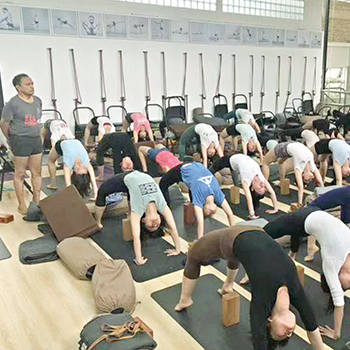
Fr. Joseph’s pioneering works came with 16 prestigious accolades, including the Ati Param Visisht Sewa Medal for Social Sciences from Association of College of Chest Physicians, New Delhi (1997), the Mother Teresa Memorial National Award (2008), the Padma Shri Award (2009), and the Life Time Award by the President of India (2014). Reflecting on these accomplishments, he says, “I always say what we say in Latin ‘Soli Deo Gloria’, which means ‘All glory goes to God’. I really believe that it is all because of the vision of Mother Teresa and Guruji BKS Iyengar.”
Vision for a healthy society
Today, with 22 residential facilities of Kripa Foundation, across India and they are soon to open their 23rd residential place in Jammu and Kashmir.
Fr. Joseph believes, “If you really develop a transformation of your consciousness, then the whole world can get healed.” The message that he would like to give people who have gone through addiction and want to really maintain their recovery is to keep practicing the recovery programme.
The seventh limb of Ashtanga Yoga:
Yama Niyama Asana are Bahiranga Sadhana (the outward practice);
Pranayam Pratyahara are Antaranga Sadhana (internal aids to self-realisation);
Dharana Dhyana Samadhi are Antaratmik Sadhana (the innermost quest).
If this, Fr. Joseph says, is integrated into the practice of yoga, you are doing Satvik yogathe yoga for purity, positivity, healthy mind and body, well-being and peacefulness. Otherwise, you’re doing Rajasik yoga—jumping like monkeys, thinking that you’re doing yoga— and then you separate your exercise from the meditation. In Iyengar yoga, meditation is the part of your Yoga practice.